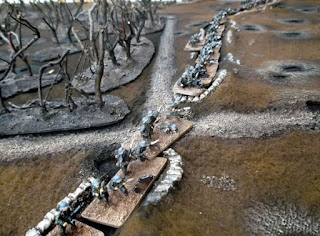Despite demoing the Oppy Wood game at Partizan back in May, James and I had never actually sat down and played the full game to a conclusion. On the day I'd spent most of the time running the 54mm game and although James had played some turns of the 12mm game inevitably talking to punters and explaining the game and background meant little real progress was made.
So we decided we needed to actually play the 12mm game through properly. Eventually we were able to align diaries and so James, myself and Simon (who drove all the way over from Buxton to Nottingham on a Monday evening - thanks mate!) convened to play Oppy Wood.
The Germans had eight units deployed in trenches with one in reserve in the Chateau in the Woods.
The British had twelve units and would be allowed to bring on some artillery support once troops had made it into the trenches.
The game is actually scaled down from the usual scale of Square Bashing where one unit of four bases represents a battalion. For our game each four stand unit represents a company with four such units making up a battalion. So James and I took command of two battalions of regulars (the 10th and 11th East Yorkshires) and a single battalion of reservists/lower quality troops to represent the 12th East Yorks who'd been in action more recently and therefore had a higher proportion of new recruits than the other two battalions.
The initial depletion of the German forces didn't go as well as they had at Partizan and as a result the Hull Pals would be (as they did in the actual battle) attacking well dug in and resolute German defenders.
The assault began with a general advance from the British, but they soon began to become entangled in the barbed wire (none of which had been cut by the initial bombardment - just like the real battle).
The British artillery called in a barrage, but most shots fell long or short though a single German company was pushed back.
The Germans in return called down a suppression barrage, further disrupting British progress
However in the centre of the line D company of the 11th East Yorks, led by 2nd Lieutenant Jack Harrison manged to breach the German defences and capture part of the trench line.
Unfortunately the British were unable to bring up enough units in support to make the breakthrough count.
Over on the right the 12th East Yorks were making no headway against undamaged German defenders (unlike in reality where the attackers on this flank made it all the way to Oppy before being captured by a German counter attack).
And on the left the 10th were facing overwhelming numbers as German reinforcements began to arrive.
At this point a British barrage caught some Germans in the open, wreaking havoc.
But the left flank still held firm
British troops tried to capitalise on the centre breakthrough but the wire and stiff German resistance was still causing problems and a German barrage didn't help matters.
Finally with the day drawing to a close D Company led an assault from the German trenches into the wood itself, but were thrown back with heavy casualties.
And with that the game ended.
The British assault had never really got going - a combination of barbed wire and caution by the British commanders meant the attack was too little too late and the Germans were able to bring up reinforcements.
So Oppy Wood, as it did in 1917, remained firmly in German hands and the British butchers bill was high indeed.
A really great evening with good company and the game itself looked brilliant. All James' hard work on the scenery really paid off and I'm really pleased we saw the project through.
If you'd like to see the game in the metal James and I are hoping to take it to the Hereward show in Pterborough in September - hope to see some of you there.
























Wonderfully impressive and delighted to hear you finally managed to play it through to a conclusion.
ReplyDeleteVery nice game report. The table set up really captures what I imagine when I think of the western front.
ReplyDeleteCheers,
Pete.